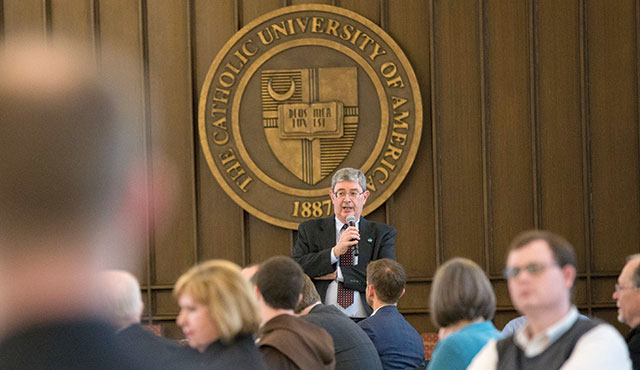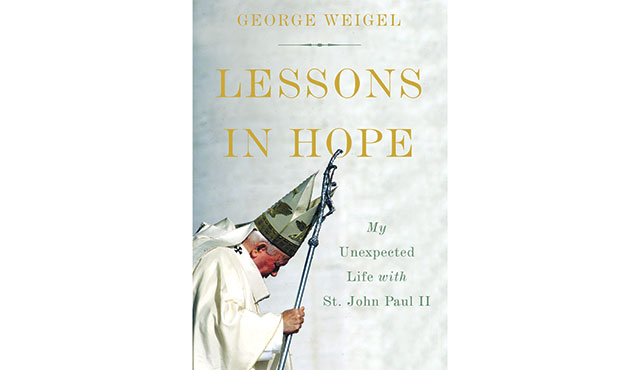Few contemporary Catholic writers and thinkers have matched the critical success of George Weigel. The prolific author of over 20 books and countless essays, Weigel is often considered the preeminent authority on the Catholic Church and the general relationship between religion and culture. Weigel will appear at Freed Theater on the Christ Cathedral campus on Nov. 8 as the latest author in the OC Catholic Book Club Author Focus Series to discuss his book, “Lessons in Hope: My Unexpected Life with St. John Paul II.”
The witness and character of Pope St. John Paul II (1920-2005) shaped and anchored the majority of Weigel’s professional accomplishments. In his early years, Weigel’s works chiefly centered on government policy. But it was after the publication in 1999 of “Witness to Hope: The Biography of Pope John Paul II” when Weigel rose to international prominence. A second study on the Polish pope, “The End and the Beginning: Pope John Paul II—The Victory of Freedom, The Last Years, The Legacy,” which largely picks up where “Witness to Hope” left off, was released in 2010.
“Lessons in Hope: My Unexpected Life with St. John Paul II,” published in 2017 by Basic Books, is more of a personal memoir from Weigel than his previous magisterial biographies. Still, Weigel considers “Lessons in Hope” a third panel to a triptych on the profound impact John Paul continues to impart, first as a survivor of World War II and later as bishop and pope for 27 ½ years. In the book, Weigel refers to the saint as “the defining personality of my professional life.”
“George Weigel has followed the papacy for twenty-five years better than anyone else,” author Fr. James V. Schall, SJ noted. In addition to his comprehensive works on the life of Pope John Paul II, Weigel’s frequent columns and other books have ranged from the reconciliation of Christianity and democracy to exploring postmodern culture’s view of faith, such as in “The Cube and the Cathedral: Europe, America, and Politics Without God.”
Weigel has also confronted crises and scandals within the church, from recent articles such as his October 10 piece in “First Things,” entitled “The Catholic Crisis, In Perspective,” to a 2002 work, “The Courage To Be Catholic: Crisis, Reform, and the Future of the Church.” A work published this past April by Ignatius Press, “The Fragility of Order: Catholic Reflections on Turbulent Times,” contains newly revised articles written over two decades that reveal the range of Weigel’s observations.
“[Weigel’s] books and essays show a remarkable grasp of the history and theology of the church and the Christian tradition,” Schall said. A frequent contributor on church matters for secular press such as NBC, Weigel is Distinguished Senior Fellow and William E. Simon Chair of Catholic Studies at the Ethics and Public Policy Center in Washington, DC. Weigel received a B.A. from St. Mary’s Seminary and University in Baltimore and an M.A. from the University of St. Michael’s College in Toronto. Among Weigel’s many speaking engagements is his frequent participation as a presenter at the annual Napa Institute Conference.
One of Weigel’s recurring themes in his writings is what he has dubbed “evangelical Catholicism.” He defined it in a 2011 essay as “primarily the voice of truly converted disciples: lay men and women, bringing the universal moral truths learned within the household of faith to bear in their workplaces, their voluntary associations, their cultural activities, and their political lives.” His 2013 book, “Evangelical Catholicism: Deep Reform in the 21st-Century Catholic Church” fully developed the theme.
The idea that the life of the faith is not simply the job of a pastor but concerns and involves the laity has come into greater focus in the time of Pope Francis, although it begun to take shape largely during the pontificates of John Paul II and Benedict XVI, Weigel believes. “Purified, mission-driven Catholicism is the Church with a vital future,” Weigel wrote this past September, linking his theme of evangelical Catholicism as a solution to avoiding scandal and crisis.
In “Lessons to Hope,” Weigel develops the idea that each person makes decisions and choices that ripple in unexpected ways. It is a central focus Weigel hopes to embark to readers of “Lessons in Hope.” It was also a major theme in Pope John Paul II’s life, who believed that “in God’s providence, there are no mere coincidences,” which John Paul himself said in 1982, a year after the 1981 assassination attempt on the pope’s life.
Weigel cites the impact of John Paul’s tireless commitment to evangelization and the passing on of the faith as integral to his own professional and personal ministry. It is this lesson in hope George Weigel hopes to share with readers and audiences.
For more information on George Weigel’s appearance at the Author Focus Series, visit occatholic.com/oc-catholic-book-club/author-focus-events/.


